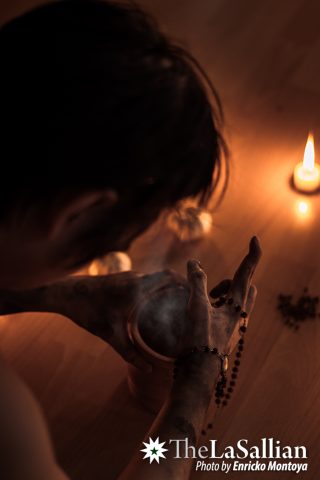
Last May 21 to 22, DLSU Harlequin Theater Guild (HTG)’s annual DuLa Salle (DLS) series made a triumphant return following its suspension amid the pandemic. The 2020 edition deviated from previous stagings as the line-up now consisted of eight 30 minute films, subsequently divided into four sets.
This year’s theme centered on the otherworldly mysteries found within Philippine folklore and history—representing kalooban (self) at its core. Each play was penned by playwrights under the tutelage of Writer’s Block Philippines. “This opportune moment gave us the chance to have seasoned [writers write] the plays for DuLa Salle,” project head Renz Manuel commented. Each brimming with insights, intriguing scripts, and outstanding casts, the films tickled the wandering mind by exploring the unknown.
Remember your roots
Set A began with Ang Habilin ni Lola Liwanag. Written by Ian Formacion and directed by Roshaun Perez, the film revolved around Juliet (Let-Let) who visits an albularyo with her mother to contact her deceased grandmother Lola Liwanag from beyond the grave and ask her for the title to her land. The film featured the struggles in the current lockdown as seen by how Let-Let’s family is having difficulty paying her school expenses. A heartfelt family drama through and through, Ang Habilin ni Lola Liwanag paints a picture of why we choose to hold on to certain memories.
Meanwhile, Abo-Kaykay told the story of Maya, an aspiring katalonan (pre-colonial shaman). The film is rife with poetic dialogue and gorgeous landscape shots. Tackling colonialism and its adverse effects on the Philippines, it sifted through the wreckage of our lost history with a careful hand. Ultimately, the film left us with a message of reclamation and defiance.
Divide and conquer
Set B kicked off with Liza Magtoto’s Mga Diyosa. Under the directorial eye of Matthew Deinla, the film dealt with four goddesses’ quest to confront the power-hungry sun god, Apolaki. Throughout their journey, Mayari, Hanan, Tala, and Buan are constantly belittled by the condescending sun god. The film touched upon gender discrimination and the bureaucratic blunders of the government by personifying them through Apolaki. The four eventually overpower the sun god, proving that women are just as capable or even stronger than him. All together, the film brilliantly melded mythology with relevant social issues to create a timeless piece that captured the ills of Philippine society.
Its sister film, Hatinggabi Camp, commented on LGBTQ+ rights and queercoding in a whimsical environment. Written by Ab Coronel and directed by Gray Jacinto, Mary Salceda, and Prince Beating, the film followed five mythological creatures—a kapre, a manananggal, a white lady, a tikbalang, and a diwata—in the eponymous camp to work out their differences. Right off the bat, one wouldn’t associate these deities with weakness. However, the film made it very clear that we all have issues to work with and it’s our choice if we want to let insecurities win or face the demons found deep within.
Forbidden footing
In the style of Romeo and Juliet, we saw Ilihan at Kalingaw’s ill-fated romance through the latter’s nightmarish fever dream. Eljay Castro Deldoc’s commentary on social class and their segregative nature illustrated how the country’s social structure is controlled by those in power. Through Juan Gabriel Castillo’s cinematic direction, the film was a powerful reminder that nothing should ever stand in the way of love.
Five monster friends are stumped after they lose an Amazing Race-esque competition for the sixth time in a row in Mamaw Ba U? Determined to win a last hurrah before they go their separate ways in college, Aletha suggested something that none of the others have ever dared to think of: become more human-like. The humorous script by Mark Norman Boquiren and the jaw-dropping makeup made for a very entertaining set. The credit, however, goes to DB Gianan’s direction which clawed deeper on prejudice and discrimination—revealing who the real monsters are.
Fatally feminine
Cafe Rosa revolved around the reunion of four friends—Trini, Marie, Aga, and Paz—in the titular fictional cafe based in Quezon City. The snappy, sharp dialogue by Dingdong Novenario paired alongside the direction of Gian Carlos Torres made the film engaging yet spooky enough to warn that something more sinister is lurking beneath the surface. Amid a backdrop of domestic violence and sexual assault, the film drew parallels between the women and Kaperosa, a spirit that lingers on as a terrifying reminder of the crimes committed against her. The cast of Cafe Rosa insist that the search for justice is not a lost cause—their stories must be told again and again until they are heard.
In Pangarap Kong Maging Manananggal, Nikki eagerly awaits for the stroke of midnight to fulfill her destiny of becoming a manananggal. Her skeptical boyfriend Baste however doesn’t seem to catch up.Things took a turn for the worse when her cousin’s boyfriend Popoy revealed himself to be the grandchild of Pedro Penduko, aspiring to follow in his aswang-killing footsteps. While the fun action-packed dramedy is the more lighthearted counterpart of Set D, it did take its time to tackle feminist themes by encouraging women to embrace their “monstrous” form.
Advancing realities
As HTG continues to shift to the online medium, DLS 2K20 Kalooban sets the standard for delivering groundbreaking visuals through imaginative storytelling. Despite the limits imposed by the pandemic, the guild continues to stay true to its aim of encouraging budding artists to bring their talents to the spotlight.
Manuel believes that easily accessible productions such as Kalooban would encourage the flame of theater to continuously burn. What matters is that the message of these films would cause a domino effect in shaping society for the better. After all, it is “teatro para sa tao,” he suggested.
(Theater for the people.)
